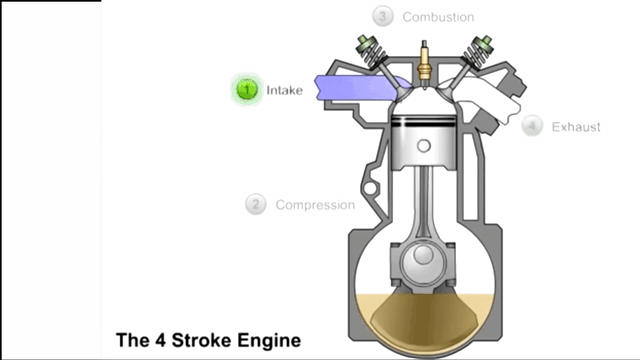Definition of Four Stroke Engine
An internal combustion engine is called four stroke engine. It is also known as a four-cycle engine because to complete a single combustion cycle it requires four separate strokes. The four strokes are named as-Definition of Four Stroke Engine- Suction or Intake Stroke
- Compression Stroke
- Power Stroke
- Exhaust Stroke
What are the Basic Components of Four Stroke Engine?
The important parts of four stroke engine are
- Piston
- Cylinder
- Connecting Rod also known as Con Rod
- Plain Bearings
- Crankshaft
- Cam and Camshaft
- Combustion Space or Cylinder Liner
- Inlet Valves and Exhaust Valves
- Pushrods
- Rocker Arms
- Fuel Injectors
How does Four Stroke Engine work?
For every two cycles of the piston, the four stroke engine provides one power stroke. So, for the single-cycle one firing occurs by the spark plug. The working principle of the four stroke engine is:
Stage-1: Intake stroke
This stage starts in the top dead center. The piston basically goes down to the cylinder and makes the chamber increase its’ space. Then the chamber becomes able to intake fuel-air mixture into the cylinder by using the intake port.Stage-2: Compression stroke
In the second phase, the piston moves back to the head. Again the volume of the chamber reduces and the mixture is compressed into the cylinder head. In addition, the temperature and pressure slightly increase here.Stage-3: Power stroke
After completing the first cycle the piston is at the top dead center again. The explosion occurs, heat produces and the piston goes down. Following this process a vehicle gets power. If the engine uses gasoline then there must be a spark plug and it helps to occur fire here. On the other hand in a diesel engine, the mixture just continuously ignites.Stage-4: Exhaust stroke
The piston returns back up again in the final stage. Exhausted valve opens here and the remaining or used gases are pushed out through the port. This process occurs for some times to ensure that the combustion chamber is totally empty.Uses of Four Stroke Engine
Four stroke engines are popular for many years. Some applications of four stroke engines are given below-
- In both single cylinder and multi-cylinder four stroke engine supports very well.
- Four Stroke Petrol Engines are very commonly known because it has the feature of low end engine punch, which defines its efficiency.
- Four Stroke Petrol Engines are used in small pumping machines, cars, auto-rickshaws, motorbikes, airplanes, etc.
- Four Stroke Diesel Engines are the most popular ones. They give support in tanks, automobiles, boats and ships, locomotives, various industrial applications, etc.
Advantages and Disadvantages of Four Stroke Engine
Advantages of four stroke engine
- Four stroke engines’ fuel efficiency is high.
- It is more torque.
- It does not require pre-mixing fuel.
- It has a balanced cooling system.
- Four stroke engine lasts very long.
- It runs really cleaner.
- Comparative very less air pollution occurs by this engine.
- It does not make so much noise.
Disadvantages of four stroke engine
- Four stroke engine is costly.
- Its’ design is complicated.
- It is heavier.
- This engine is not so powerful.




Post a Comment